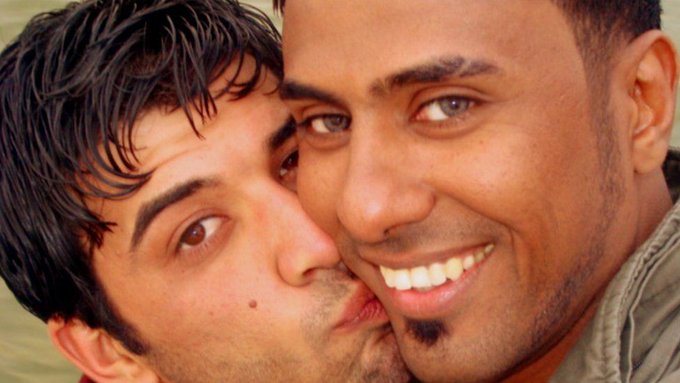CNN profiles Michael Failla, a Seattle native who helps LGBTQs in the Middle East. For example:
Of the documentary, Joan Burnett notes:

Work needs to be done around the world -- which includes in the US and in Iraq. Focusing on Iraq, Sulaymaniyah has been the site of protests last week. We saw the security officials crack down on the students. Repression is a hallmark in Sulaymaniyah. Earlier this year, The International Lesbian, Gay, Bisexual, Trans and Intersex Association noted, "Human rights organisations called upon the Iraqi Kurdistan Regional Government to enact laws to prevent systemic state-sponsored harassment and violence against LGBTIQ people in the region, after people were arbitrarily arrested in the city of Sulaymaniyah." Fundan Jacob Tweets:
Staying with Sulaimani, RUDAW reports:
Head of Sulaimani’s ruling party on Sunday said the government failed to
meet the demands of student protesters and that his party would try to
find a way to help the students who last week staged days of protests
that were met with a violent crackdown.
Patriotic Union of Kurdistan (PUK) leader Bafel Talabani met with
students on Sunday. “We sat down. I wanted to know what the problems of
these students are. We understood each other very well,” he told
reporters. “I was honestly expecting the government to look out for them
better. These are our sons and daughters. Unfortunately they couldn’t
meet their demands enough. We will find a mechanism so that the party
can meet their demands more.”
Well what do you know, Hiro Talabani can still be active. Took her long enough to deploy one of her sons publicly but if the Talabanis ever want to return to prominence, they're going to need to convince the Kurdish people that they'll speak out for them.
Returning to the topic of discrimination in Iraq, Jabar Dastbaz (RUDAW) reports:
Nergiz Bahmani sits in a gynecologist’s office in Sanandaj, in Iran’s
Kurdistan province. Rage and anger paint her facial features. She is
pregnant and wants an abortion, unwilling to experience the physical and
mental agony she suffered after her first child. But a new law has made
access to medications, pills, and abortion clinics more difficult.
“I got married ten years ago and, mentally, I wasn’t ready to have
children. But, pressured by my husband’s family, I was obligated to get
pregnant six years ago. After giving birth, I got depression and a
number of physical illnesses. Sometimes I wished death upon my child
because I thought the child was the cause of my pain,” Bahmani, 36, told
Rudaw English.
“I no longer want to have a child. The psychologists who I visited also
told me that,” she said, her hands shaking. “Two weeks ago, I was told
I’m pregnant, despite using the pill. I don’t want to suffer from my
previous pain again.”
A new law, however, is making it difficult for Bahmani to get the
abortion she wants. The Youthful Population and Protection of the Family
law has generated a lot of controversy among women’s civil and rights
activists.
The law severely restricts access to abortion, contraception, and
voluntary sterilization services. The goal is to boost the declining
fertility rates, but critics say the law tramples on women’s human rights.
Under the law, those who facilitate abortion are threatened with heavy punishment. UN experts
have called for its abolishment, referring to article 61 that states
that abortion, if carried out on a large scale, would fall under the
crime of “corruption on earth” and would carry the death penalty.
Since the law came into force, access to birth control and abortions has fallen. Women who were previously able to obtain an illegal abortion can no longer do so.
A prominent example of the disrespect for females in Iraq is child marriage. Last week, a court began attempting to 'legalize' the marriage of a 12-year-old girl to a man twice her age. Shawn Yuan (ALJAZEERA) reports:
A court has resumed hearing a case in which a judge was asked to formalise a religious wedding between a 12-year-old girl and a 25-year-old man, raising concerns across Iraq.
It was not clear whether a verdict would be given on Sunday.
The court, located in Baghdad’s Kadhamiya district, adjourned the case last week as demonstrators rallied in front of the court, chanting and holding banners with slogans such as: “Child marriage is a crime against children,” and “No to child marriage”.
“Children should be at home watching cartoons, not be married,” said one demonstrator in front of the courthouse last week. “That’s why we are here today to show our condemnation.”
Still on the topic of the disenfranchised, Dilan Sirwan (RUDAW) reports:
Kurdistan Region President Nechirvan Barzani on Sunday acknowledged
persisting obstacles in front of achieving gender equality in Iraq and
the Region, calling on both men and women to cooperate in order to
overcome these hurdles.
President Barzani gave his keynote speech at the Gender Equality &
Women’s Empowerment Strategies: The Case of the Kurdistan Region of Iraq
conference held by the University of Kurdistan-Hewler (UKH) in Erbil as
part of international campaign 16 Days of Activism Against Gender-Based
Violence.
“There are many reasons that have oppressed women in our society such as
forced marriages, honor killings, sexual assault, domestic violence, or
ignorance,” Barzani said. “By standing against all this, not only do we
reduce oppression against women, we also clear out that ugliness from
our culture.”
Barzani said the goal of the Kurdistan Region’s leadership is “to turn
society into a center where women have the same freedoms as men to
develop their abilities.”
Kat's "Kat's Korner: Documenting Joni's epic talents live" went up this morning. The following sites updated:
